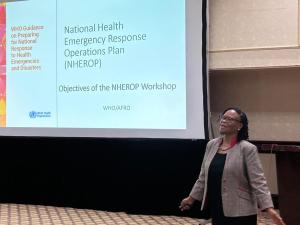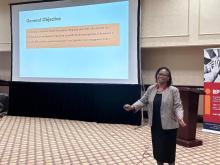Botswana National Health Emergency Response Operation Plan: A Framework for Resilience
In recent years, the world has witnessed a significant rise in public health emergencies and disasters due to environmental degradation, climate change, socioeconomic inequalities and increased cross-border movement of people and cargo. Such crises disrupt societies, causing loss of life, causes deaths and widespread suffering, and severe disruptions to health systems. For Botswana, the COVID-19 pandemic served as a stark reminder of the country's vulnerability to such emergencies. Previously, Botswana's most prominent health crisis was cholera outbreak recorded in 2009, along with other challenges such as outbreaks of malaria, diarrhea in children under five due to rotavirus and other hazards such as road traffic accidents, fire incidents, droughts and the adverse effects of weather. Botswana continues to experience few Public Health Emergencies (PHEs) and disasters resulting from natural and man-made hazards. When they occur, they cause morbidity and mortality, and loss of livelihoods.
These recurring challenges underscore the urgent need for a cohesive national plan to prepare for, respond to, and recover from public health emergencies. Recognizing this need, Botswana has embraced the International Health Regulations (2005) which is a legally binding framework designed to enhance public health emergency preparedness and response among Members States. The first Botswana Joint External Evaluation (JEE) which monitors the level of compliance of member states to IHR 2005, was conducted in 2017, followed by the second JEE in March 2024. Both evaluations highlighted critical gaps in Botswana’s emergency preparedness, notably the absence of a comprehensive National Health Emergency Response Operations Plan (NHEROP), a key document that describes how the health sector will manage its responses to emergencies related to any kind of hazard. Consequently, Botswana prioritized development of NHEROP aligning it with the broader National Disaster Response Plan and strategies.
This plan will guide Botswana to prepare, detect, respond and effectively recover from any public health emergency as it is robust framework that enables a country to address public health threats proactively and efficiently. Its overarching objective is to enhance resilience to public health emergencies through structured and well-coordinated, multi-layered response system and emphasizes early detection and quick response mechanisms to minimize the negative impacts of emergencies. It also outlines systems and mechanisms for response activation, maintenance, deactivation, and eventual transition into recovery phases.
The development of NHEROP was a collaborative effort involving various government departments and divisions within Ministry of Health, Ministry of Agriculture (MOA), Ministry of Environment & Tourism (MET) Ministry of Lands & Water Affairs, Water Utility Corporation (WUC) Ministry of Local Government & Rural Development (MLGRD) Botswana Bureau of Standards (BOBS), Radiation Protection Inspectorate, Botswana Unified Revenue Services (BURS),Botswana International University of Science & Technology (BIUST),Botswana University of Agriculture & Natural Resources (BUAN), Botswana Recross, Botswana, Food Agriculture Organization (FAO),Civil Aviation Authority of Botswana (CAAB), Department of Immigration, Department of Road Transport & Safety (DRTS), National Agriculture Research Development Institute (NARDI),National Disaster Management Office (NDMO),University of Botswana (UB),USAID, The US-CDC and WHO Country Office. The collaborative spirit and shared expertise of these contributors reflect a commitment to a safer, healthier Botswana. This exemplifies government high commitment to tackle public health threats in a coordinated and multi-sectoral approach.
The NHEROP represents a significant milestone in Botswana's journey toward resilient public health system in emergencies strengthens Botswana's ability to withstand and recover from public health emergencies. The plan is not only a policy document but also a call to action, urging all Batswana to unite in protecting public health and building a safer future.



